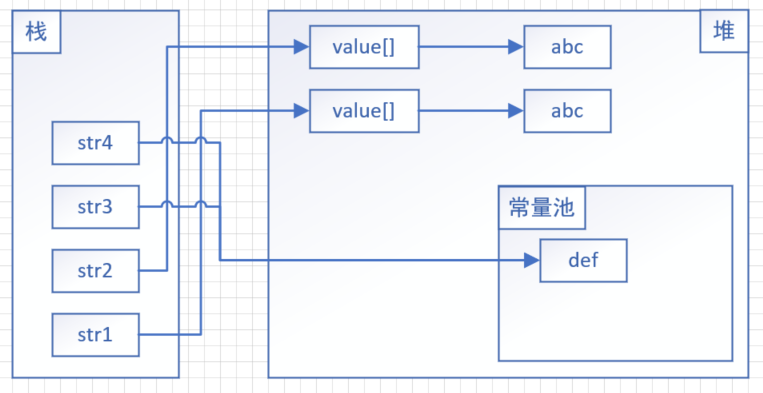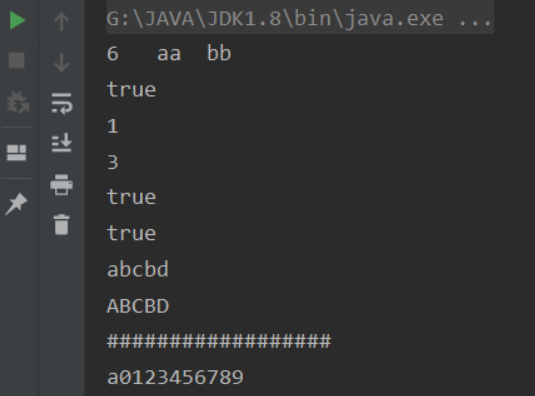23java的String类常用方法
String 类
String类是包含于java.lang包里面的。
下面根据String的源码来学习String类(由于需要反复测试,为避免重复,所以只放程序的主体部分)。
String类的对象的内存关系:
String str1 = new String("abc");
String str2 = new String("abc");
System.out.println(str1.equals(str2));
System.out.println(str1 == str2);
String str3 = "def";
String str4 = "def";
System.out.println(str3 == str4);
System.out.println(str3.equals(str4));
运行结果:
为何会出现这种情况?
下面看这四个字符串的内存图,str1和str2都是使用new创建的新的String类的对象,它们指向的不是同一个地址,对象str1/str2储存的是它们保存字符串的地址,显然str1和str2的内容相同,但是内存地址不同。对于str3和str4,是字符串常量,它们的内容是保存在常量池中的,JDK的管理机制就是如果常量池中保存有这个内容,再次创建的对象保存的内容是常量池中已经存在的,那么就不再开辟新的内存保存相同的内容,而是让这个新的对象直接指向原来的内容。也就是说:str3和str4的内容的地址是同一个,得证。
String类的charAt()方法:
String str4 = "def";
System.out.println(str4.charAt(2));//查找index=2所在位置的字符
System.out.println(str4.indexOf('f'));//查找字符'f'所在位置的索引
运行结果:
显然,charAt()方法是寻找字符串中某个索引位置的字符。如果超出字符串的索引,会报错:
看这个错误信息:
第一行提示:StringIndexOutOfboundsException,字符串超出索引异常;
第二行提示:at java.lang.String.charAt(String.java:658),提示源码中charAt()方法所在的位置,下面是源码:
public char charAt(int index) { if ((index < 0) || (index >= value.length)) { throw new StringIndexOutOfBoundsException(index); } return value[index]; }第三行提示:at testString.myString.main(myString.java:14),提示这个错误在本程序中的位置
String类中的substring()方法
String str5 = "qwert";
String substr5=str5.substring(2);
System.out.println(substr5);
运行结果:
功能显然:返回字符串中指定位置到末尾的一个新字符串,源码如下:
/** * Returns a string that is a substring of this string. The * substring begins with the character at the specified index and * extends to the end of this string. <p> **/ public String substring(int beginIndex) { if (beginIndex < 0) { throw new StringIndexOutOfBoundsException(beginIndex); } int subLen = value.length - beginIndex; if (subLen < 0) { throw new StringIndexOutOfBoundsException(subLen); } return (beginIndex == 0) ? this : new String(value, beginIndex, subLen); }注意:这里的截取的一个字符串是一个新的字符串对象。
String类中replace()方法
String str6 = "asd";
String str7 = str6.replace('s', 'x');
System.out.println(str7);
运行结果:
String类中split()方法
String str8 = "ffd,gfj,hhh";
String[] str8Array = str8.split(",");
for (int i = 0; i < str8Array.length; i++) {
System.out.println(str8Array[i]);
}
运行结果:
String类的其他方法
String str7 = " aa bb ";
String str77 = str7.trim();
System.out.println(str77.length()+"\t"+str77);
System.out.println("Abc".equalsIgnoreCase("abc"));
System.out.println("Abcbd".indexOf('b'));
System.out.println("Abcbd".lastIndexOf('b'));
System.out.println("Abcbd".startsWith("Ab"));
System.out.println("Abcbd".endsWith("bd"));
System.out.println("Abcbd".toLowerCase());
System.out.println("Abcbd".toUpperCase());
System.out.println("##################");
String gh = new String("a");
for (int i = 0; i < 10; i++) {
gh = gh + i;
}
System.out.println(gh);
运行结果:
自学java,请多多指教!










